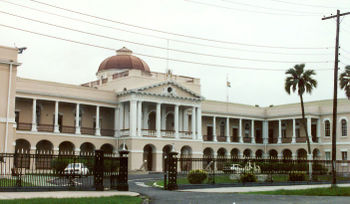Will APNU eventually vote for Anti-
Money Laundering law? Western
diplomats warn of "serious
consequences"
- Friday, 07 February 2014 15:23
Parliament Building
“We encourage all stakeholders to work together to finalize AML/CFT (Anti Money Laundering and Countering of Financing Terrorism) legislation and ensure its effective implementation in order to prevent and combat money laundering and terrorist financing, as well as to avoid the serious consequences that would arise from black-listing by the FATF,” said the top American, British, Canadian and European Union (EU) envoys here.
Government and the Private Sector Commission (PSC) have repeatedly urged the opposition to support the amendments and avert blacklisting that could significantly impact on incoming and outgoing transfers for fuel, pharmaceutical and other supplies if goods and services. The Chief Executive Officer of Guyana Bank for Trade and Industry, John Tracey has already said that with the regional blacklisting by the Caribbean Financial Action Task Force (CFATF) correspondent banks have in some instances been asking for additional information
The statement was issued by D. Brent Hardt, Ambassador of the United States of America; Andrew Ayre, High Commissioner of the United Kingdom; Nicole Giles, High Commissioner of Canada and Robert Kopecky, Ambassador of the European Union.
The diplomats’ statement came shortly after a late Friday morning news conference by the Opposition Leader who said that his 26-seat A Partnership for National Unity (APNU) would consider voting in favour of amendments to the AML/CFT if the bill is fixed to its satisfaction.
While Granger has vowed not to vote for government-piloted Bills unless the President signs into law several opposition-approved Bills, he Friday signaled that APNU could vote for the AML/CFT “We will vote if we feel the outcome is in the national interest,” when asked if his party would vote ‘yes’ if it was satisfied that government was taking steps to ensure that opposition-approved Bills are eventually assented by the President.
He stressed that much depended on whether President Donald Ramotar gives a commitment that he would assent to those bills if they are debated in the House and passed by a two-thirds support.
Asked specifically whether his coalition’s support for the AML/CFT Amendment Bill would be tied to the assent of the opposition bills that have been passed by the House, Granger said “Well, it would include what we chose to include,” he said. “When it comes to the floor of the National Assembly, the popular vote will determine the outcome,” he said. Granger said he was unprepared to say whether APNU was prepared to miss the deadline of mid-February at which time FATF would meet to decide the country’s fate.
Asked why APNU did not participate in recent sittings of the parliamentary select committee to consider amendments to the AML/CFT Act, he said that was due to parliamentary travel duties by his party’s “principal advisers” Carl Greenidge and Jaipaul Sharma.
Granger could not immediately provide details about the changes that APNU would like to see made to the Bill but said there were concerns about “enormous enforcement powers in the hands” of the Finance Minister rather than law enforcement agencies. They could include violation of human rights through searches on persons and their families.
The Western Diplomats welcomed the willingness demonstrated by all parties to move Guyana toward compliance with international Anti Money Laundering/Combatting the Financing of Terrorism (AML/CFT) standards, including updated legislation and enhanced investigative capacity.
They noted that they have with all stakeholders, including those from government, opposition, civil society, and the private sector on many occasions since 2012.
“Our governments are, and will continue to be, actively engaged to support effective implementation of AML/CFT legislation and prosecution of money launderers and financers of terrorism,” they said.



![Leader of the APNU, David Granger. [iNews' Photo]](http://www.inewsguyana.com/wp-content/uploads/2013/09/Granger-300x300.jpg)